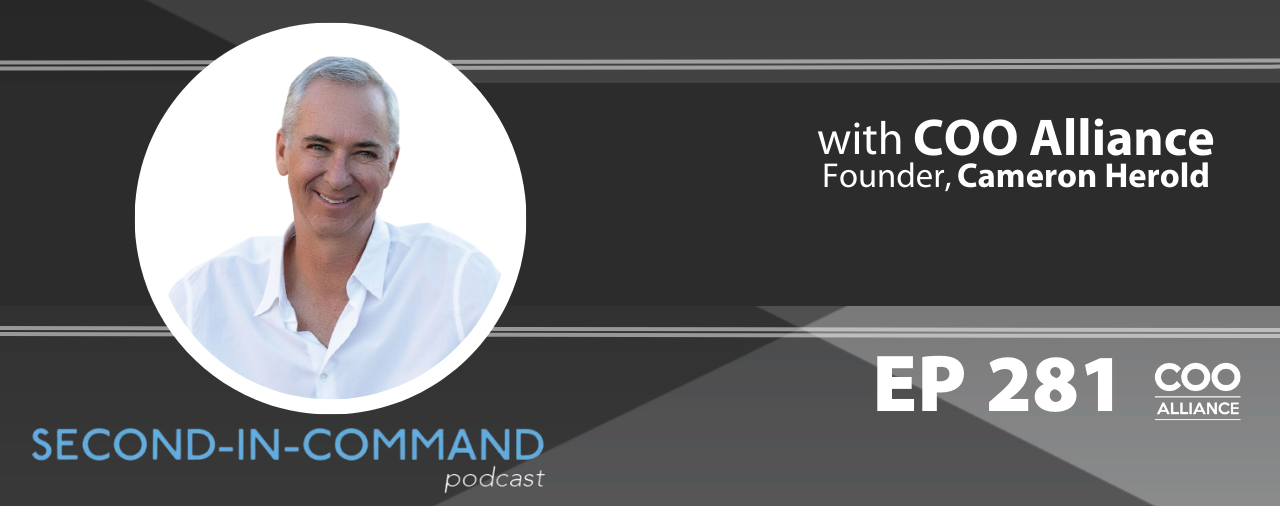The relationship between a CEO and a COO is vital for a business. It’s a yin/yang relationship, where the COO can help to bolster areas where the CEO may be weak while executing the CEO’s larger vision. In today’s episode, Cameron provides insight into this relationship – how to measure its quality and identify possible warning signs. You’ll discover why one of the primary tasks for a COO is to bring the CEO back down from the stratosphere once in a while. You’ll also learn the importance of being present to help each other solve problems.
Share This Episode On:
In This Episode, You’ll Learn:
- Why the COO needs to help keep the CEO “grounded” from time to time.
- The importance of core values and taking care of each other.
- The warning signs to watch for in a COO/CEO relationship.
- And much more.
Resources:
Connect with Cameron: Website | LinkedIn
Get Cameron’s latest book “Second in Command: Unleash the Power of your COO”
Subscribe to our YouTube channel – Second in Command Podcast on YouTube
Get Cameron’s online course: Invest In Your Leaders
—
I’m excited to dive into a topic that’s so important for every business, the relationship between a CEO and a COO. Trust me, it’s a dynamic that can make or break an organization. Being a CEO and COO is like a yin and yang dance. The COO steps in to strengthen the areas where the CEO may have weaknesses while also executing the CEO’s grand vision. It’s a beautiful balance that ensures the smooth functioning of the company.
I’ll give you some practical tips on how to measure the quality of this partnership and how to spot potential warning signs. Plus, we’ll explore the significance of being present for each other, especially when it comes to problem-solving. After all, two heads are better than one. If you’re eager to learn more about nurturing a successful CEO-COO partnership and gaining insights into the do’s and don’ts, this episode is a must-listen. Let’s dive in.
—
We both measure our HRV, which measures the tonality between our sympathetic nervous system and our parasympathetic. You want that healthy tone from going into your sympathetic or your fight or flight, and moving into your parasympathetic, which is your rest and digest. It’s the accelerate-or-break analogy. If we use HRV as a measure of the tone and quality of how our nervous system is operating, using that metaphor, what should we look for in terms of measuring the quality of the relationship between the CEO and the COO?
This first is on the quality of the relationship. I’ll talk about this part first. The COO needs to be able to watch the CEO and be able to pull them back down from the stratosphere once in a while to say, “We’re being a little erratic. Let’s come back down to reality,” or “You look like you’re a little stressed. You look like you’re a little depressed. You look like you’re a little burned out. Why don’t you get the heck out of here for the day, for the weekend, for the week, or a few weeks? Get off the grid and decompress. You need to be more like a racehorse. We need you to show up and be performing. You can’t do that at 60 to 70-hour weeks.”

CEO COO Relationship: The COO needs to watch the CEO and be able to pull them back down from the stratosphere once in a while to say, “Hey, we’re being a little erratic.”
Brian and I would routinely pull each other aside. I would grab Brian and say, “Let’s go walk and talk.” I’d be like, “Dude, you’re off right now. You have crazy energy or you’re moping around the office and you’re down. Get out of here.” He would call me and say, “Don’t tell anybody, but I’m at home. I’m lying in my basement. The lights are off. I’m having a bit of a stressful day. Tell the leadership team whatever you want to tell them and text me later.” I’ll say, “Yes.” I’d be like, “Brian is offsite working from the club. He’s got some meetings with the lawyers offsite today. Everything is good.” Meanwhile, I know he’s at home with his head under the duvet going, “I hope tomorrow is better.”
You need that. You need to cover for each other. Behind the scenes, Brian would go and tell the employees, “Cameron needs to be the hard ass. Cameron needs to be hard at this. I need Cameron to roll out the tough decisions.” He just cares about the core values or cares about the vision. We were always making each other look good.
The way that you have to work on that relationship and take care of each other, as you asked about, is you need to have a date night. You need to have time away from the office together as friends doing stuff that you like to do that’s fun. You need to be able to decompress together. I’ll give you the specifics again of what Brian and I would do.
For a couple of years, every Tuesday and Thursday morning, we would go for runs together. On Tuesday morning, he would come to my home and we would then head out for the run. On Thursday morning, I would go to his home and we would head out for the run. We used to go and work on Fridays from the Arbutus Club, his tennis club, and we would sit at the tennis club, both of us with our laptops. We’d work for 4 or 5 hours together. Sometimes, we would never even talk. Other times, we’d be working away and we’d have some stupid joke. We’d tell the other and we’d laugh.
We were always out going for drinks together and going for dinners together and blowing off steam. We would also get away from the office and go on retreats, just the two of us. We would go away for two days to a chalet up at Whistler or Brew Creek Lodge or his parents’ cottage on Bow Island. We would spend time just the two of us, thinking about the business, thinking about the team, collaborating together, and then we would get back together with the kids or with the team. We would tell them where we were going. We’d get them to help figure out how. We had lots of time to stay on the same page, build relationships, have fun together, and decompress together.
I could relate to this so vividly. We used to go skiing for a week every year, speaking about it earlier. That was the time when you got away and over a period say, “Look what worked well last year, what didn’t work so well? Where’s our relationship at the moment?”It was a reset for the next twelve months. Maybe others within the business didn’t fully appreciate that time that we spent away, but it was so critically important.
As you scale, some of the things you need to be aware of and certainly be very conscious of is that support for one another. What do you need to be mindful of also as the pressure comes on in terms of ensuring that support for one another? What are the warning signs that something is happening here in the context of this relationship that I need to be aware of?
One is to be mindful that you’re always watching the other person to help them remove obstacles, and to help them get better in their role. It’s confidentially behind the scenes showing the other person their blind spots. I speak about The Emperor’s New Suit. It’s the old Aesop fable about the king getting these clothes made. He’s got this magic tailor who’s building this beautiful suit of clothes.
Everyone in the room is going, “There’s no clothes. You’re trying on nothing. You’re putting air on top and you’re pretending it’s this magical light suit.” The king goes out marching in the parade and he’s just wearing his underwear. This little three-year-old goes, “The king is naked,” and it embarrasses the king. Behind the scenes, someone needed to tell the king he was naked. No one had the courage to do that. If you did it in front of everybody else, the king would get upset.

CEO COO Relationship: You need to be there for the other person.
Behind the scenes, I needed to be able to say to Brian, “You’re screwing up. You’re missing this. We’re not doing this well enough.” I do it in a safe place. He needed to be able to say to me, “You’re not delegating enough. You need to delegate more. Let’s get that off your plate. Why are you doing all this stuff and not growing people?”
That was something that I could have been much better at in the first 2 or 3 years that we were building the company together. I was so, “I’ll work hard. I’ll take all this on,” that I didn’t get stuff off my plate soon enough to other people who were capable, or even get it off my plate to people who weren’t necessarily capable and just grow their capabilities so that they could do it more. He was playing that for me.
Also, being there to help each other solve problems. I remember one day, I couldn’t solve this one problem. It was based on what were our commission structures going to be for these roles. I needed to use I think it was algebra, the A squared plus B whatever equals something. I sat down with Brian and he goes, “It’s just algebra.” He hopped on a whiteboard and showed me. I’m like, “It’s amazing.” He’s like, “How did you not see it?” I’m like, “I was so close to it that I couldn’t even solve my own problem.” You need to be there for the other person in that case as well.





